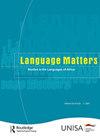Evaluativity in the Afrikaans Equative and Excessive Constructions
IF 0.8
3区 文学
0 LANGUAGE & LINGUISTICS
引用次数: 0
Abstract
Abstract Afrikaans has two degree modifiers translatable as “much,” “many,” or “a lot,” namely veel and baie. However, the default excessive and equative constructions in Afrikaans are te veel (too much) and ewe veel (as much), not te baie and ewe baie. This article argues that veel is dominant in these constructions because the atypical/marked status of te baie and ewe baie can lend these formulations a marked meaning. Specifically, this marked meaning is argued to be one of evaluativity, where baie in these constructions makes reference to a high degree, whereas veel does not. Native speaker judgements support this interpretation, but also show that baie can have a bleached meaning in these constructions, serving as a neutral substitute for veel. This possibility is attributed to a process of markedness shift, where because of its ubiquity in other degree-modification contexts, baie is inserted in the equative and excessive as well.南非荷兰语等量结构和过度结构中的评价性
南非荷兰语有两个程度修饰语,可译为“很多”、“许多”或“很多”,即veel和baie。然而,在南非荷兰语中,默认的过度和等同结构是veel(太多)和ewe veel(同样多),而不是baie和ewe baie。本文认为,在这些结构中,元音占主导地位,因为元音和母羊的非典型/标记地位使这些表述具有标记意义。具体来说,这种标记的意义被认为是一种评价性,在这些结构中,baie指的是高度,而veel则不是。母语人士的判断支持这种解释,但也表明baie在这些结构中可以有一个漂白的意思,作为veel的中性替代品。这种可能性归因于标记转换的过程,由于它在其他程度修饰的语境中无处不在,因此也被插入到等量和过度中。
本文章由计算机程序翻译,如有差异,请以英文原文为准。
求助全文
约1分钟内获得全文
求助全文
来源期刊

Language Matters
Multiple-
CiteScore
1.20
自引率
0.00%
发文量
19
期刊介绍:
The purpose of Language Matters is to provide a journal of international standing with a unique African flavour focusing on multilingualism in Africa. Although the journal contributes to the language debate on all African languages, sub-Saharan Africa and issues related to multilingualism in the southern African context are the journal’s specific domains. The journal seeks to promote the dissemination of ideas, points of view, teaching strategies and research on different aspects of African languages, providing a forum for discussion on the whole spectrum of language usage and debate in Africa. The journal endorses a multidisciplinary approach to the study of language and welcomes contributions not only from sociolinguists, psycholinguists and the like, but also from educationalists, language practitioners, computer analysts, engineers or scholars with a genuine interest in and contribution to the study of language. All contributions are critically reviewed by at least two referees. Although the general focus remains on multilingualism and related issues, one of the three issues of Language Matters published each year is a special thematic edition on Language Politics in Africa. These special issues embrace a wide spectrum of language matters of current relevance in Southern Africa.
 求助内容:
求助内容: 应助结果提醒方式:
应助结果提醒方式:


